Are you in search of a loyal and affectionate companion? Look no further than the Cocker Spaniel!
This breed is not only known for its loving nature but also its versatility in both apartment living and outdoor adventures.
However, there is much more to discover about this delightful breed. From their origins and physical characteristics to their personality traits and health concerns, this article will provide you with all the essential information you need.
So, if you're curious to learn more about the wonderful world of Cocker Spaniels, keep reading to uncover the fascinating details that make them such a beloved breed.
Key Takeaways
- Cocker Spaniels have a sweet temperament and are affectionate and playful.
- They require gentle handling, early socialization, and training for their well-being.
- Cocker Spaniels can be prone to certain health issues, such as eye problems and allergies.
- They are well-suited to apartment living but need daily activity and engagement to stay happy and well-behaved.
Origin and Purpose
The Cocker Spaniel breed originated in the United States and was specifically developed for hunting purposes. These dogs were bred to be excellent hunting companions, known for their ability to flush out and retrieve game birds.
Their compact size and agile bodies make them well-suited for navigating through various terrains. Cocker Spaniels have a keen sense of smell and a strong prey drive, which allows them to track and locate game. They're also known for their endurance and willingness to work in adverse weather conditions.
Today, while many Cocker Spaniels are kept as beloved family pets, their hunting instincts and abilities still shine through, making them versatile and capable in various activities such as obedience, agility, and field trials.
Physical Characteristics

After learning about the origin and purpose of the Cocker Spaniel breed, let's now explore its physical characteristics.
Cocker Spaniels are medium-sized dogs with a charming and beautiful appearance. They've medium-sized bodies covered in silky fur, large expressive eyes, and long feathered ears.
The coat of a Cocker Spaniel is thick and sometimes wavy, with shorter fur on the head and back and longer tufts on the ears, chest, belly, and legs. Their coat comes in a variety of solid colors and parti-colors with white.
Grooming can be intensive and potentially expensive, as their coat requires regular maintenance. Professional groomers may be necessary every 6-8 weeks to keep their coat in top condition.
Personality Traits
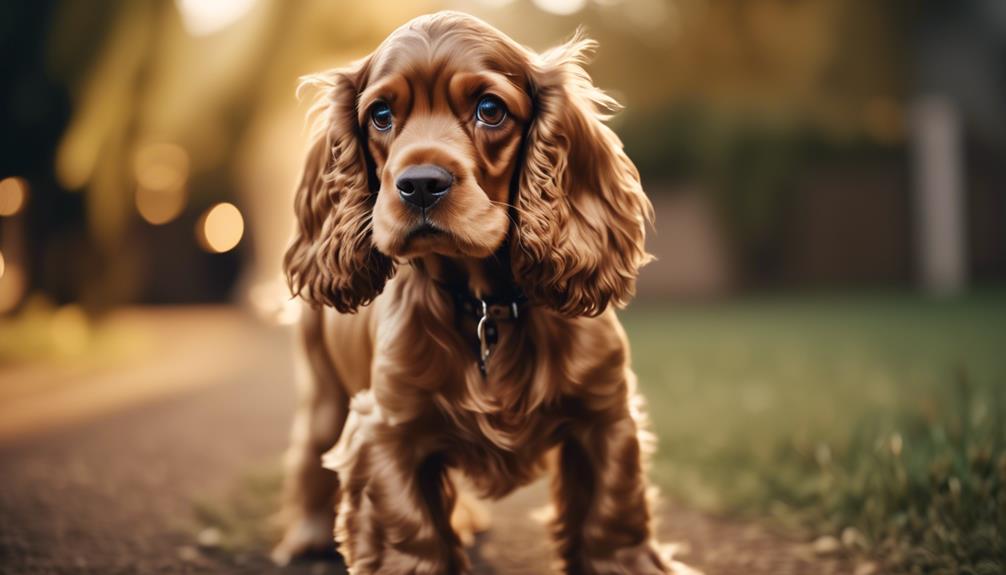
Cocker Spaniels are known for their sweet temperament and affectionate nature. They're incredibly loving and enjoy being around their owners. These dogs form strong bonds with their families and are often described as being very loyal.
Cocker Spaniels are also known for being playful and enjoy engaging in activities with their loved ones. They've a gentle nature and require gentle handling and positive reinforcement during training.
Early socialization is vital for Cocker Spaniels to ensure that they grow up to be well-adjusted and friendly dogs. Overall, Cocker Spaniels are delightful companions who bring joy and happiness to their families with their loving and affectionate personalities.
Health Concerns

When considering the health of Cocker Spaniels, it's important to be aware of certain potential concerns. These include:
- Eye Problems: Cocker Spaniels are prone to various eye conditions such as cataracts, glaucoma, and progressive retinal atrophy. Regular eye exams are essential to catch any issues early on.
- Autoimmune Hemolytic Anemia: This is a condition where the immune system attacks and destroys red blood cells. It can lead to anemia and other serious health problems. Close monitoring and proper treatment are necessary.
- Hypothyroidism: Cocker Spaniels are susceptible to an underactive thyroid gland, which can cause weight gain, lethargy, and skin problems. Regular thyroid function tests are important for early detection and management.
Care and Grooming
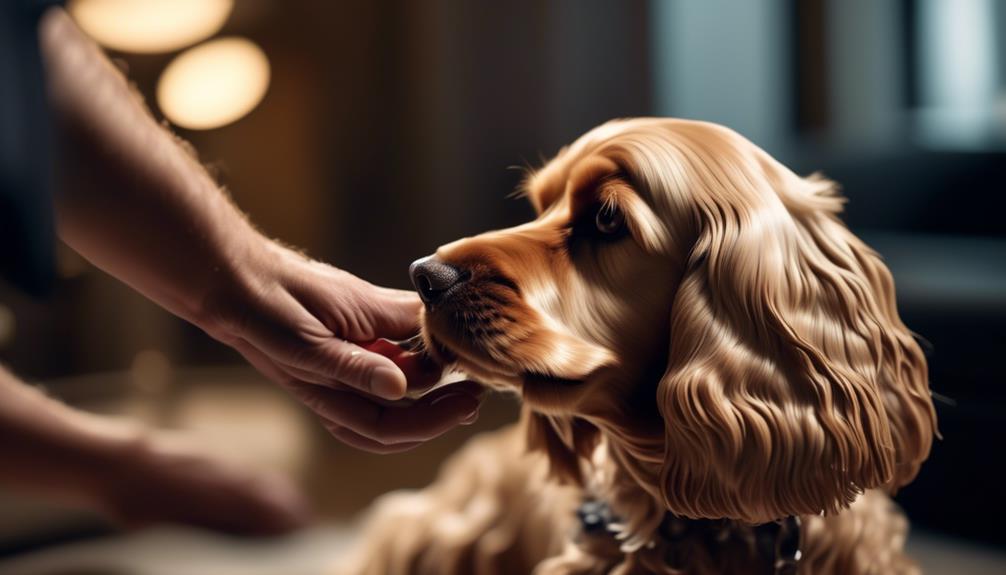
To properly care for and groom your Cocker Spaniel, it's important to establish a regular grooming routine that includes proper coat maintenance and overall hygiene. Grooming can be intensive and potentially expensive, so it may be necessary to seek the assistance of professional groomers every 6-8 weeks.
Cocker Spaniels have a thick, sometimes wavy coat with shorter fur on the head and back, and longer tufts on the ears, chest, belly, and legs. Regular care includes nail trimming and ear checks, as Cocker Spaniels are prone to ear infections.
Wiping their ears with a gentle ear cleaner and using deep, narrow bowls for food and water can help maintain their health. By prioritizing proper grooming and care, you can ensure that your Cocker Spaniel maintains their beautiful appearance and stays healthy.
Behavior and Training

Are you looking to understand the behavior and training needs of your Cocker Spaniel? Here are some important points to consider:
- Aggression and Fear: Aggression in Cocker Spaniels can often stem from fear and anxiety. Proper training and socialization can help them overcome these issues.
- Tendency to Bark or Howl: Cocker Spaniels are known to be vocal dogs, so be prepared for some barking or howling. Consider your living situation and neighbors when choosing this breed.
- Wanderlust Potential: Some Cocker Spaniels have a higher tendency to wander and roam. Make sure to provide a secure and fenced area or keep them on a leash when outside.
Interaction With Children and Other Pets
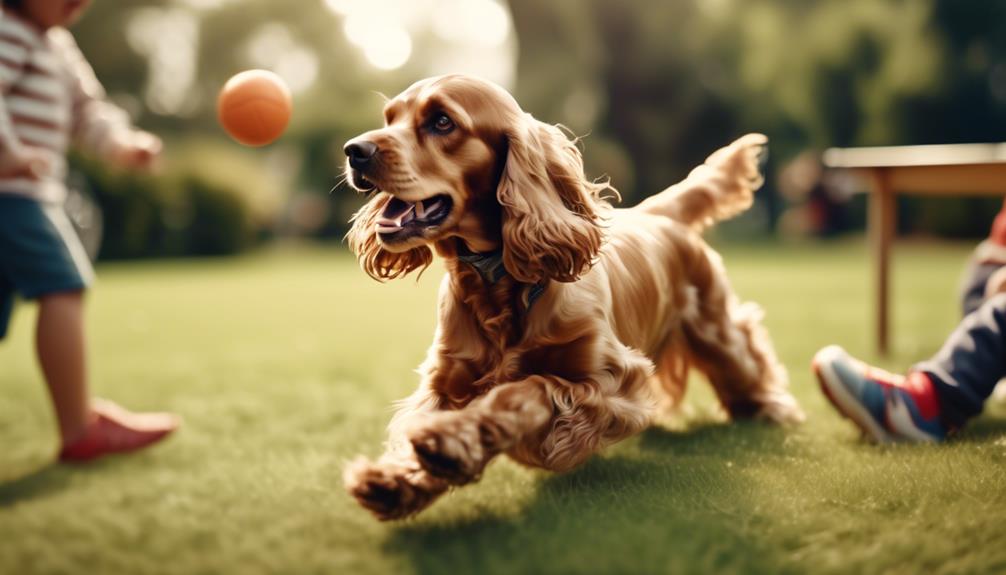
Interaction with Children and Other Pets is a key aspect of owning a Cocker Spaniel. This breed is known for its friendly disposition and ability to get along well with children and other family pets. When raised together and treated kindly, Cocker Spaniels can form positive relationships with children. However, it is important to supervise their interactions to ensure safety for both the dog and the child. With proper training and introduction, Cocker Spaniels can also get along with other family pets. Their harmonious nature makes them a great addition to multi-pet households. Here is a table summarizing the Cocker Spaniel's interaction with children and other pets:
| Interaction with Children | Interaction with Other Pets |
|---|---|
| Friendly and gentle | Can get along with proper training and introduction |
| Requires supervision | Harmonious addition to multi-pet households |
Finding a Good Dog Breeder
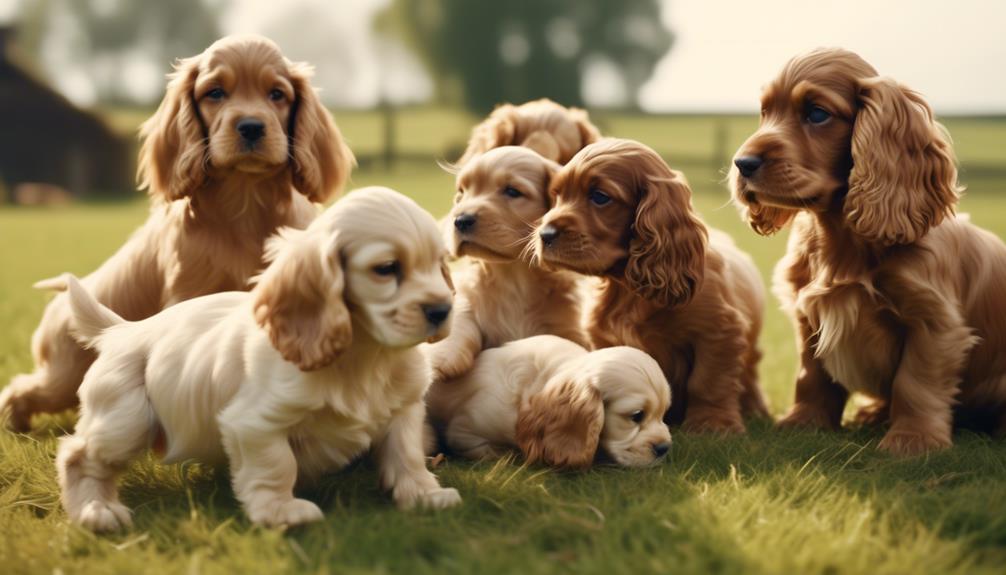
When looking for a Cocker Spaniel, it's essential to find a reputable dog breeder who prioritizes the health and temperament of their puppies. Here are some key points to consider when searching for a good dog breeder:
- Conduct thorough research: Take the time to research different breeders in your area. Look for breeders who have a good reputation and positive reviews from previous customers.
- Visit the breeder's facility: Make sure to visit the breeder's facility in person to assess the living conditions of the dogs. A reputable breeder will have clean and well-maintained facilities.
- Ask for health clearances: A responsible breeder will provide you with health clearances for the parents of the puppies. This ensures that the puppies are less likely to develop genetic health issues.
Finding a good dog breeder is crucial to ensure that you're getting a healthy and well-tempered Cocker Spaniel. Take the time to do your research and ask the breeder the necessary questions to make an informed decision.
Cocker Spaniel Rescue Groups

If you're unable to find a reputable breeder, consider reaching out to Cocker Spaniel rescue groups for the opportunity to provide a loving home to a Cocker Spaniel in need. These rescue groups specialize in finding homes for Cocker Spaniels that have been abandoned, surrendered, or found as strays. They work tirelessly to ensure the well-being and happiness of these dogs.
By adopting from a rescue group, you aren't only giving a deserving dog a second chance at life but also supporting their mission to save more Cocker Spaniels. Rescue groups often have a thorough screening process to match you with the right dog based on your lifestyle and preferences. They also provide support and guidance throughout the adoption process and beyond.
Cocker Spaniel Breed Organizations
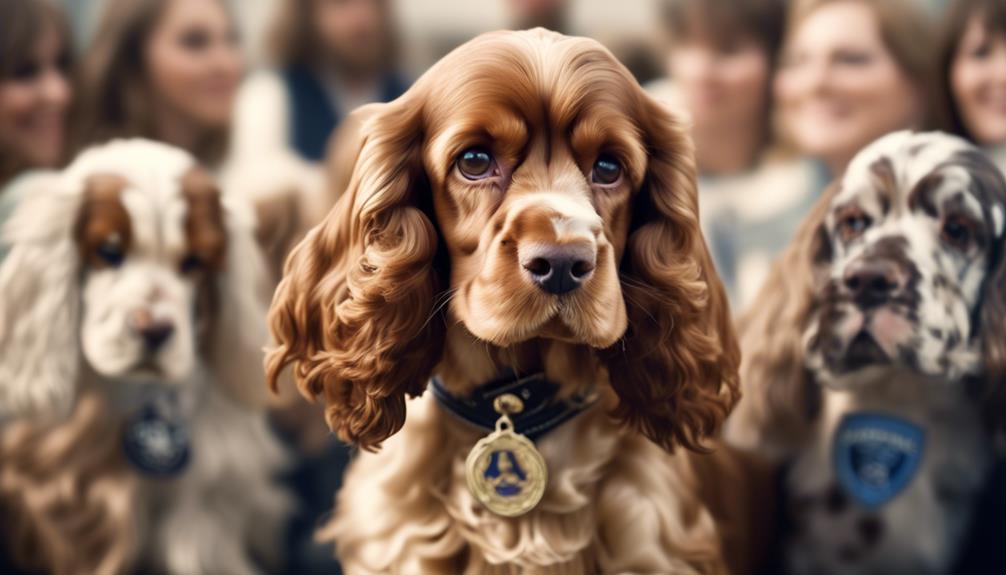
Consider connecting with Cocker Spaniel breed organizations to find reputable breeders who prioritize the health and well-being of their puppies. These organizations can provide valuable resources and guidance in your search for a responsible breeder.
Here are three reasons why you should consider reaching out to Cocker Spaniel breed organizations:
- Access to reputable breeders: Breed organizations maintain a network of breeders who adhere to strict standards of health, temperament, and ethical breeding practices. By connecting with these organizations, you increase your chances of finding a breeder who prioritizes the overall well-being of their puppies.
- Health screening and socialization: Reputable breeders affiliated with breed organizations ensure that their breeding stock undergoes thorough health testing to minimize the risk of inherited health issues. Additionally, they prioritize early socialization of puppies, which contributes to their well-rounded development.
- Lifetime support: Breed organizations provide ongoing support and guidance to puppy owners throughout the lifetime of their Cocker Spaniels. This support can include access to educational resources, networking opportunities with other Cocker Spaniel owners, and assistance with any challenges that may arise.
Frequently Asked Questions
Are Cocker Spaniels Hypoallergenic?
No, cocker spaniels are not hypoallergenic. They have a thick, sometimes wavy coat that can trigger allergies in sensitive individuals. Regular grooming and cleaning can help minimize allergens, but they are not considered a hypoallergenic breed.
What Is the Average Lifespan of a Cocker Spaniel?
The average lifespan of a Cocker Spaniel is 12-15 years. They are sweet, affectionate dogs that require gentle handling, early socialization, and training. Their size ranges from 14-15 inches tall and 20-30 pounds.
Do Cocker Spaniels Have a Strong Prey Drive?
Yes, Cocker Spaniels have a strong prey drive. They are hunting dogs, so they have a natural instinct to chase and pursue prey. This is something to consider when training and socializing them.
Are Cocker Spaniels Good With Cats?
Yes, Cocker Spaniels can be good with cats. They can form positive relationships with cats when introduced properly and given time to adjust. Supervision and training are important to ensure harmony between them.
How Often Should Cocker Spaniels Be Bathed?
You should bathe your Cocker Spaniel every 4-6 weeks to keep their coat clean and healthy. Regular grooming is important for their overall well-being and to prevent any skin issues.
What Are the Similarities and Differences Between Cocker Spaniels and Cockapoos?
Cocker Spaniels and Cockapoos have similar cockapoo breed characteristics, as both are affectionate, loyal, and intelligent. However, Cockapoos are a mix of Cocker Spaniels and Poodles, making them hypoallergenic, while Cocker Spaniels are not. Additionally, Cockapoos tend to be smaller in size compared to Cocker Spaniels.
Conclusion
In conclusion, the Cocker Spaniel is a loyal and affectionate companion that brings joy to any family. Their sweet temperament and playful nature make them a perfect addition to both apartment living and outdoor adventures.
With proper training and socialization, they form strong bonds with their owners and are always eager to please. While they may be susceptible to certain health issues, their love and devotion will make them a cherished member of your family for years to come.




